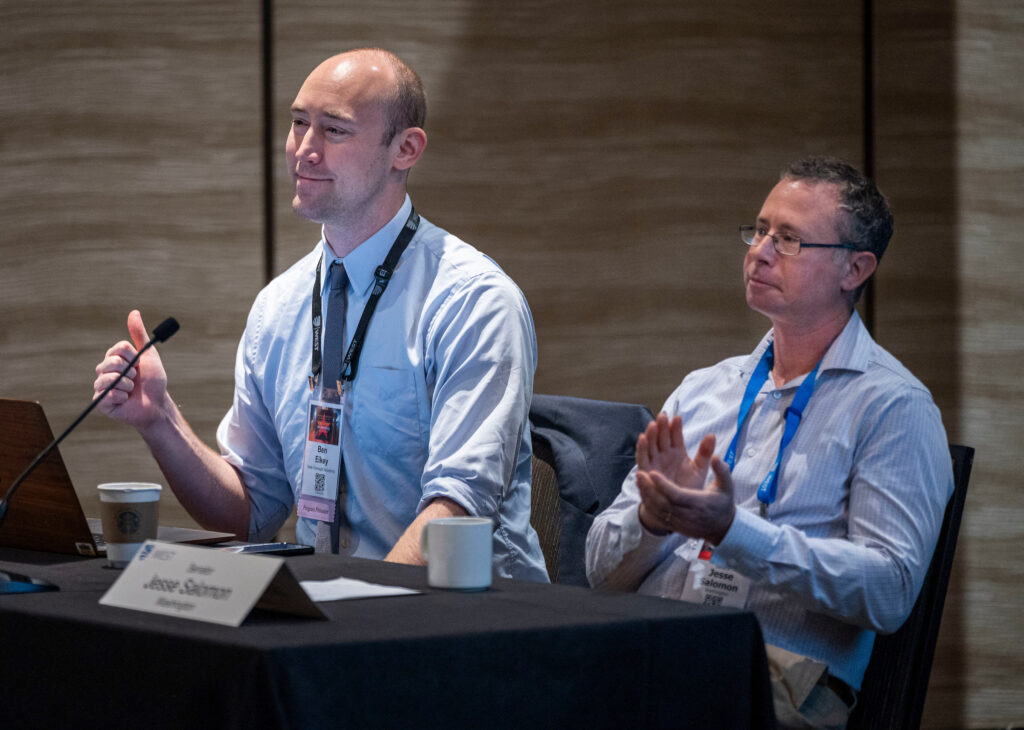Public Safety Committee Recap:
Alaska Senator Matt Claman, co-chair of the CSG West Public Safety Committee, was graciously joined by Washington Senator Jesse Salomon. CSG West thanks Senator Salomon for stepping in to present legislative efforts and co-facilitate the session.
Addressing gaps in juvenile justice to identify a path forward
Ben Eikey, Levin Center for Oversight and Democracy, and Senator Jesse Salomon (WA) presented data and legislative perspectives on juvenile justice reform, including:
- Reducing juvenile incarceration rates
- Increasing diversion from the juvenile justice system
- Reducing recidivism
- Addressing mental and behavioral health issues
- Increasing data sharing

Eikey provided a historical perspective going back to the 1990s when there was a growing nationwide sentiment to be tough on crime. Following this period, there was a rampant increase in trying 16 and 17-year-olds as adults. Texas even created a maximum-security prison for juveniles. Approximately 4,000 youths were in detention centers for low-level offenses such as delinquency, skipping school, and petty theft. In 2006, state legislatures began hearing testimony, including the impact on the mental health and suicide rates of juveniles incarcerated in adult prisons.
A trajectory of progress: Connecticut case study
In Connecticut, a joint bipartisan committee was dedicated solely to evaluating policies related to the juvenile justice system, including recommendations on how to reduce juvenile incarceration rates, increase diversion from the juvenile justice system, reduce recidivism, and address mental and behavioral health issues.
Between 2015 and 2018, enacted legislation eliminated mandatory minimums for low-level drug offenses, strengthened visitation policies for all prisoners with children under age 18, raised the age of juvenile justice jurisdiction to 21, prohibited discrimination in employment, housing, public education, insurance, and government program and services based on criminal history. View their dashboard here to track progress and legislation.
Senator Salomon shared Washington House Bill 1324 concerning scoring prior juvenile offenses in sentencing range calculations. The bill intended to enact the juvenile justice system’s goals of rehabilitation and reintegration. Some of those goals included bringing Washington in line with most states that do not consider prior juvenile offenses in sentencing range calculations for adults. The reason for not doing so is the expansive body of scientific research on brain development. Specifically, an adolescent’s perception, judgment, and decision-making differ significantly from that of adults. Another reason is facilitating due process within the juvenile court system. Members expressed great interest in this legislation and shared their states’ efforts and experiences addressing it.
Improving Outcomes for Youth (IOYouth) – CSG Justice Center
The CSG Justice Center provides valuable juvenile justice resources. The Improving Outcomes for Youth (IOYouth) works with state and local jurisdictions to align their policies, practices, and resource allocation with what research shows works to reduce recidivism and improve outcomes for youth while enhancing public safety. You can access many resources here: CSG Improving Youth Outcomes Program Juvenile Justice Equity Dashboard.